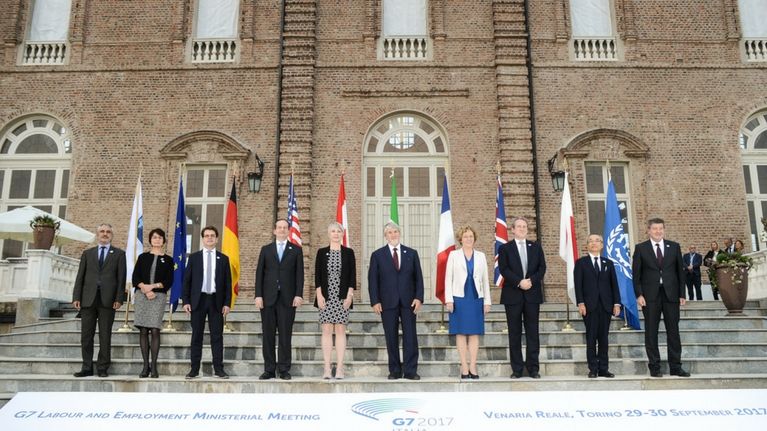ILO head calls on global community to ensure “that the great transformations underway in the world of work are shaped to create the decent jobs people want and need”.
 TURIN (ILO News) – Ministers of Labour and Employment of G7 countries met in Turin on 29-30 September to discuss the Future of Work. Their concluding statement “For a Better Future of Work: Pathways for Action” was “a strong statement of Ministers’ intent to boost the quality and quantity of jobs and foster inclusive labour markets and societies”, according to ILO Director-General Guy Ryder.
TURIN (ILO News) – Ministers of Labour and Employment of G7 countries met in Turin on 29-30 September to discuss the Future of Work. Their concluding statement “For a Better Future of Work: Pathways for Action” was “a strong statement of Ministers’ intent to boost the quality and quantity of jobs and foster inclusive labour markets and societies”, according to ILO Director-General Guy Ryder.
The ILO leader participated in one and a half days of discussions with Ministers including a session on the ILO Global Commission on the Future of Work . The programme also included an exchange of views with representatives of G7 trade unions and business.
“I was pleased to introduce the recently established ILO Global Commission on the Future of Work to Ministers. They expressed strong support for the initiative and indicated a number of issues they would like the Commission to address.”
“Ensuring that the great transformations underway in the world of work are shaped to create the decent jobs people want and need is hugely important all around the world” said Ryder. He added that “G7 countries are amongst those on the frontier of technological changes that have great promise for better lives but which equally could lead to many working women and men being left behind.”
“Good policies and the active engagement of the social partners can and must shape change to meet societies’ expectations of a fair and just transition to patterns of inclusive and sustainable growth and development.”
The Ministerial Declaration builds on the “G7 People-Centred Action Plan on Innovation, Skills and Labour” and the “G7 Roadmap for a Gender-Responsive Economic Environment” adopted at the Taormina G7 Summit in May. The Declaration highlights three main areas:
- Promoting skills and fostering labour rights
- Labour, employment policies and social protection policies
- Fostering a multi-stakeholder approach
Ministers agreed to strengthen employability as forms of work change by, amongst other things, “promoting a favourable legal and regulatory framework to protect the freedom of association and workers’ voice”. They also reaffirmed the crucial role in the changing world of work of “providing high standards of access to, and coverage by, social protection and social security, to support workers in non-standard and new forms of work, including those engaged in platform-based activities.”
“Promoting inclusivity in innovation and the future of work through close cooperation and dialogue among policy-makers, social partners, the private sector, education and training providers, innovation analysts and other relevant actors” was a further priority identified by Ministers.
The Meeting concluded with the launch of a “G7 Future of Work Forum” to share strategies, exchange good practices and experiences. The Forum will be set up and managed by the OECD in cooperation with the ILO.
G7 Heads of the National Employment Agencies and representatives of the social partners met during the Meeting to discuss the role of activation policies in supporting women and men in their integration in the labour market, in reducing inequality and in protecting workers in vulnerable situations, including those engaged in new forms of work. They agreed on the need to improve the efficiency and equity of active labour market policies, employment services and social protection policies. They will continue to collaborate share knowledge and exchange practice amongst themselves and with the social partners.
Source: ILO




























